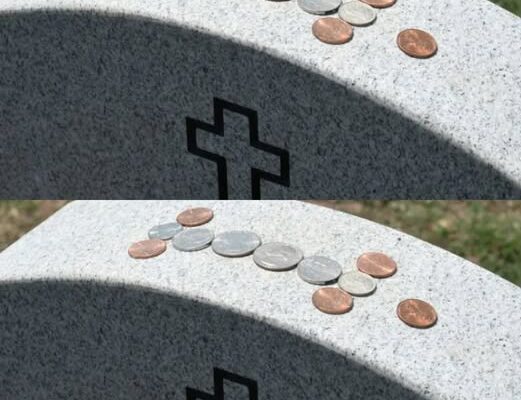If you’ve ever walked through a military cemetery or passed a gravestone bearing a small coin, you may have wondered what it means. It’s not random. It’s not forgotten pocket change. That small, humble object placed with care carries a message deeper than words—a message of honor, remembrance, and silent connection.
This tradition—placing coins on the gravestones of veterans—is a longstanding and sacred act of tribute observed across the United States. Rooted in military culture and carried forward by civilians and fellow service members alike, each coin left behind serves as a quiet note of gratitude, a symbol of presence, and a powerful gesture that transcends time.
The Origin of the Tradition
While the exact origins of the tradition are debated, many believe it traces back to ancient times when coins were placed on the eyes or graves of the dead as offerings for safe passage into the afterlife. In modern American practice, however, the coin tradition is most closely associated with military culture—especially in cemeteries like Arlington National Cemetery, where countless visitors leave coins to honor fallen heroes.
In the context of U.S. military service, the tradition gained greater visibility during the Vietnam War. As the country became deeply divided over the war, many soldiers returning home felt unwelcome, even shunned. Leaving coins on the graves of fallen comrades became a discreet way for veterans to pay their respects without getting caught in the politics of the time. It was a personal, peaceful, and meaningful way to say, “I remember you. I was here.”
The Meaning of Each Coin
What’s remarkable is that each denomination of coin has its own significance. This isn’t just about the act—it’s about what the act conveys.
-
A Penny: Perhaps the most common coin left behind, a penny tells the world, “I visited.” It’s a gesture of remembrance, a way of saying, “You are not forgotten.” It may come from a stranger, a family member, or someone who just wanted to acknowledge the sacrifice made by a person they never met.
-
A Nickel: This coin indicates a closer bond. It means the visitor trained with the deceased, perhaps sharing long days of drills, hardship, and hope in boot camp. It is a sign of shared beginnings, of the brotherhood or sisterhood that starts the moment recruits put on a uniform together.
-
A Dime: A dime carries even more weight. It means the visitor served alongside the fallen during active duty. Whether they were in the same unit, on the same base, or under the same flag in combat, this coin signifies shared trials, courage, and duty.
-
A Quarter: The rarest and most powerful coin in the tradition, a quarter means the person leaving it was there when the soldier died. It’s a statement of presence during the most painful moment of service. It means the visitor stood witness, offered comfort, or fought beside their comrade during their final breath. It is the heaviest token, not in weight but in emotion.
Why This Tradition Matters
What makes this small ritual so poignant is its simplicity. In a world full of noise, performance, and grandeur, the quiet clink of a coin on stone stands apart. There’s no need for fanfare. Just that one gesture, left with intention, carries the power of connection, of remembrance, and of unspeakable gratitude.
For families who visit the graves of their loved ones and find these coins, it means everything. It tells them their loved one was not forgotten. It affirms that their sacrifice is still honored—not just on Memorial Day or Veterans Day, but on any given Tuesday, by someone who remembers.
A Tradition Worth Continuing
So the next time you find yourself in a cemetery and notice a small coin resting on a gravestone, pause. That coin isn’t just metal. It’s a message. It’s history. It’s love. And if you feel moved to leave a coin of your own, know that you are participating in something timeless.
With just a penny, you can say, “I remember.”
With a dime, you can say, “We served.”
With a quarter, you can say, “I was there.”
And all of it whispers one message that cannot be erased: Honor lives on.



